An arctic blast that gripped much of the United States has left more than 700,000 without power, at least 17 weather-related deaths and thousands stranded due to flight cancellations.
Plummeting temperatures were expected to bring the coldest Christmas Eve on record, and energy systems across the country were strained by rising demand for heat and storm-related damage to transmission lines.
The latest outage numbers are a sharp drop from the 1.8 million US homes and businesses left without power as of early Saturday morning, according to tracking site Poweroutage.us.
Many electric companies continued to ask customers to conserve energy by not running large appliances and turning off unneeded lights.
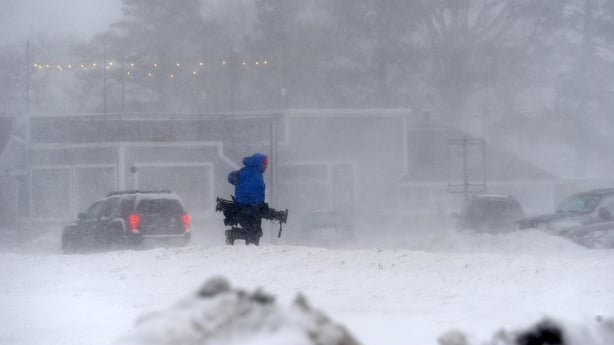
Duke Energy initiated rolling blackouts across North and South Carolina, in 15 to 30-minute intervals until additional electricity is available, the company told its customers.
"As extreme temps drive unusually high energy demand across the Carolinas we have begun short, temporary power outages," the company said on Twitter. "These emergency outages are necessary to protect the energy grid against longer, more widespread outages."
Disruptions upended daily routines and holiday plans for millions of Americans during one of the year's busiest travel periods.
What is a weather 'bomb cyclone'?
The arctic cold combined with a "cyclone bomb" of heavy snow and howling winds roaring out of the Great Lakes region yesterday and into the Upper Mississippi and Ohio valleys wreaked havoc on power systems, roadways and commercial air traffic.
Extreme winter weather was blamed for at least five deaths yesterday.
Flight cancellations
More than 2,700 US flights were cancelled, with total delays tallying more than 6,400, according to flight-tracking service FlightAware.
More than 5,000 flights were cancelled yesterday, FlightAware said.
The American Automobile Association had estimated that 112.7 million people would venture 80km or more from home between the 23rd of December and the 2nd of January. But stormy weather heading into the weekend likely ended up keeping many people at home.
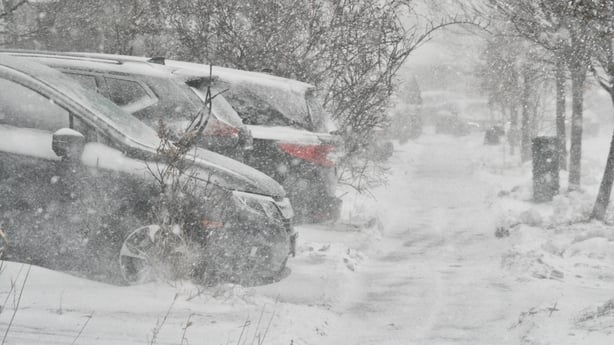
Weather-related car accidents around the country left at least 16 dead and hundreds stranded on ice and snowbound roads, according to media reports.
From the Canadian to the Mexican border and coast to coast, some 240 million people in all were under winter weather warnings and advisories of some sort yesterday, according to the National Weather Service (NWS).
In Erie County, in upstate New York, about 500 motorists were stranded in their vehicles last night, with the National Guard called in to help with rescues, Erie County Executive Mark Poloncarz told media. At least one person was found dead in a car, he said.
"There's no place for anyone to go, everything's closed, so just stay home," he told MSNBC.
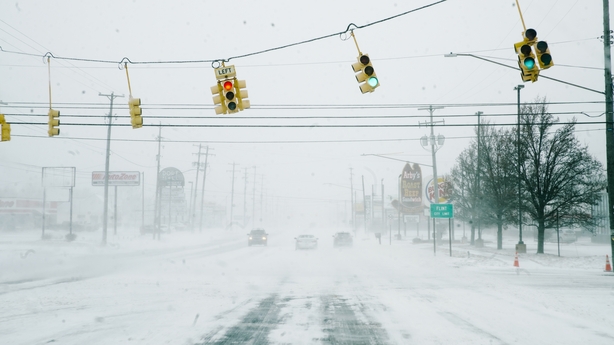
Two motorists were killed, and numerous others injured, in a 50-vehicle pileup that shut down the Ohio Turnpike in both directions during a blizzard near Toledo, forcing an evacuation of stranded motorists by bus to keep them from freezing, officials said.
Three deaths were reported in Kentucky, where Governor Andy Beshear, warned residents, "Stay home, stay safe, stay alive."
"I know it's really hard because it's Christmas Eve. But we're having dozens and dozens of accidents," he said in an online briefing. "It's simply not safe."
Blizzard conditions remained for Buffalo, New York, and its surrounding county on the edge of Lake Erie in far western New York where almost 2m of snow will fall by Sunday, the NWS said.
The city imposed a driving ban on Friday that remained in effect, and all three Buffalo-area border-crossing bridges were closed to inbound traffic from Canada.
Meteorologist Kelsey McEwen in Toronto tweeted that waves of up to eight metres were reported in Lake Erie, while in Ohio's Fairport Harbor, winds gusted to 120km/h, the NWS tweeted.
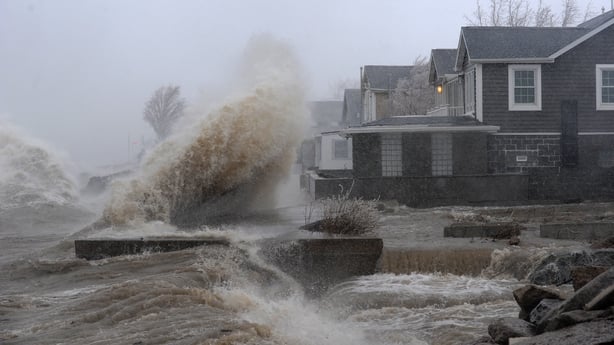
Temperatures were forecast to top out on Saturday at just -13 Celsius in Pittsburgh, surpassing the city's previous all-time coldest Christmas Eve high of -10.5C, set in 1983, the NWS said.
Cities in Georgia and South Carolina - Athens and Charleston - were likewise expected to record their coldest daytime Christmas Eve high temperatures, and Washington, D.C., was forecast to experience its chilliest since 1989.
The flurry of yuletide temperature records was predicted as a deep freeze sharpened by perilous wind chills enveloped much of the eastern two-thirds of the nation.
"The cold snap will persist through Christmas," said meteorologist Ashton Robinson Cook, at the NWS Weather Prediction Center.
Minneapolis was the coldest spot in America on Saturday at -21C.
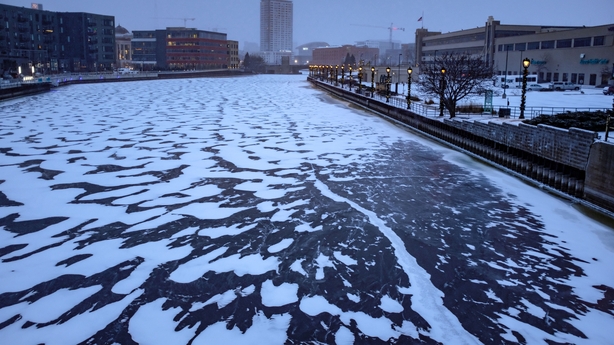
On Christmas morning, the coldest spot will be Fargo, North Dakota at minus -28C, Mr Cook said.
It will start to moderate west-to-east across America, with the high plains and Central US getting back to normal by Tuesday, but it won't warm up on the East Coast until Thursday or Friday, he said.
"For now it's staying cold," he said.
The severe weather prompted authorities across the country to open warming centers in libraries and police stations while scrambling to expand temporary shelter for the homeless.
The challenge was compounded by an influx of migrants crossing the US southern border by the thousands in recent weeks.
The National Weather Service said its map of existing or impending meteorological hazards "depicts one of the greatest extents of winter weather warnings and advisories ever."
Canadian authorities have also issued severe weather warnings. Hundreds of thousands were left without power in Ontario and Quebec provinces, while many flights were cancelled at airports in Vancouver, Toronto and Montreal, and some trains stalled.
Frustration growing
In El Paso, Texas, desperate migrants who had crossed from Mexico huddled for warmth in churches, schools and a civic center, Rosa Falcon, a school teacher and volunteer told AFP.
But some still chose to stay outside in frigid temperatures because they feared attention from immigration authorities, she added.
In Chicago, Burke Patten of Night Ministry, a nonprofit dedicated to helping the homeless, said: "We've been handing out cold weather gear, including coats, hats, gloves, thermal underwear, blankets and sleeping bags, along with hand and foot warmers."
